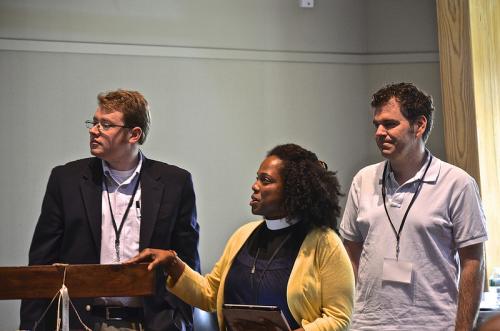
Reviving Worship in the Heart of a City
By Dorothy Bass and Tuesday Rupp, M.Div. ‘13
St. Paul’s Episcopal Church in Richmond, Virginia, occupies a large, distinguished building near the state capitol. It also occupies a noteworthy place in the history of the city—once as the “cathedral of the Confederacy,” when Jefferson Davis governed from Richmond, and a century later as a center of support for civil rights and other progressive causes. Today, change is in the air. The surrounding area has been gentrified, and about 40,000 new residents—many of them young adults working in technology or the professions—have moved in. Sensing a new opportunity to serve a changing downtown, St. Paul’s recently hired a new priest to develop a “Downtown Mission.” The leadership team from St. Paul’s came to the Congregations Project Summer Seminar looking for conversation about how to reach out to these newcomers in ways that go beyond the parish’s traditional worship and ministries.
The Reverend Melanie Mullen, the Downtown Missioner, has already helped the church find new ways—and revive ancient ways— of bringing worship further into the heart of a city in the midst of transformation. One example is the Stations of the Cross service held on Good Friday in the Richmond Farmers’ Market—a service of witness and healing performed on the very ground that once held a slave market. Another example is the Eyes on Richmond series, a lunchtime forum held regularly at the parish hall that invites the citizens of Richmond to explore issues facing the city. Jazz services, artistic events, and conversations in pubs amplify the growing repertoire of outreach experiments, adding to a number of other longstanding programs such as a noon preaching series held on weekdays during Lent. The experiments have been invigorating and creative, but project leaders wonder if they add up to a coherent strategy rather than a restless set of attempts. More important, do they address the needs of the people now living in this area?
David Sinden, St. Paul’s organist and music director, and Brian Levey, a lay member of the worship board, joined Mullen in proposing the Downtown Mission as a focus for their Summer Seminar project. When the three leaders shared their hopes, all agreed that community is what brought them to church and that building community will be important as this ministry develops. Yet community seems slow to emerge. People are watching their outdoor liturgical experiments and visiting their in-house events, but few have yet moved toward deeper, transformative participation.
During the Summer Seminar, other participants encouraged the team to make strong, focused efforts to listen to the needs and stories of the congregation’s new neighbors. What rituals are meaningful to them? What preconceptions do they have of St. Paul’s? What are their stories? Listening and responding authentically need to be central to the Downtown Mission.
“I have been called as a ‘missioner’ in a congregation that does not have the word ‘mission’ in its vocabulary,” Melanie Mullen mused at one point. “The congregation has a strong taste for evangelism and desire for community, but we do not always articulate our goal clearly in relation to God.”
Other seminar participants thought that attention to stories might provide a good way of connecting disparate concerns about the relationships among unchurched neighbors, the church’s heritage, and the well-being of their city. For example, if St. Paul’s were to host a festival on the banks of the James River—a favorite weekend gathering place—might they listen to and tell stories about rivers, including the rivers that run through scripture? What other big images from Christian tradition might also take on life and open up connections through the mutual sharing of stories? Bread … fire … body … water … exodus, a passing over to freedom? In any case, urged faculty member Maggie Dawn, be authentic. Think of what you are doing as encouraging a movement, not building an institution.